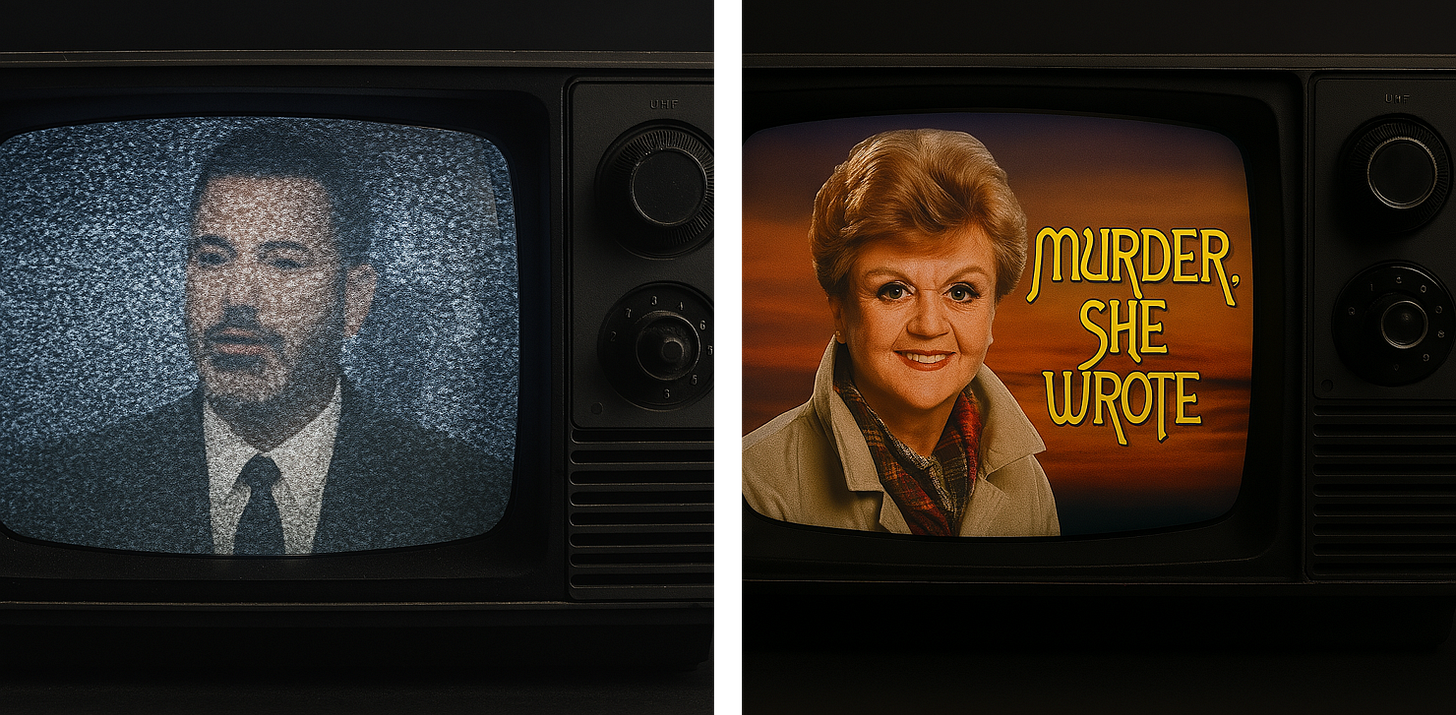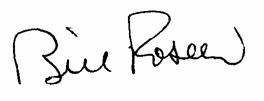The First Amendment Doesn't Flinch
Networks are free to be 97% negative, and 100% protected
The Trump-aligned head of the Federal Communications Commission threatens. ABC yields. Just like they did in the George Stephanopoulos incident. Just like Intel did. Like Harvard. Like Paramount/CBS, who canceled Colbert while seeking merger approval.
One of the chapters in the authoritarian playbook reads: “Consolidate media in the hands of loyalists.”
Check.
Let’s be clear: the suspension of Jimmy Kimmel isn’t, in itself, a First Amendment violation. ABC, as a private company, has every legal right to pull a show, even if the decision reeks of capitulation. That’s not censorship. That’s corporate discretion.
But the problem isn’t the firing.
The problem is the pressure.
When a sitting FCC Chairman threatens to revoke licenses or block mergers unless a broadcaster silences a critic, that’s not regulation, it’s retribution. It’s Viewpoint Discrimination enforced through structural power. And it sends a message to every media outlet: dissent has consequences. Even, or especially, comedy, which often penetrates the world’s thinnest skin.
The defense that “these are private decisions” is a smokescreen. If suspending Jimmy Kimmel is a corporate choice, then so is keeping him on the air. But when that choice defies government preference, the pressure begins. They want it both ways, corporate autonomy when it silences critics, government intervention when it doesn’t.
To understand how we got here, and what might be ahead, we need to revisit the FCC’s legal mandate, the limits of its authority, and the constitutional guardrails now being tested.
What Is the FCC and What Does It Do?
To grasp the gravity of these threats, we must remember what the FCC was created to protect, and what it was never meant to become.
The Federal Communications Commission (FCC) was established on June 19, 1934, through the Communications Act of 1934, replacing the earlier Federal Radio Commission. Its purpose was to regulate interstate and international communications by radio, television, wire, satellite, and cable. The Act also transferred telephone oversight from the Interstate Commerce Commission to the FCC, consolidating regulatory authority across major communication technologies.
From its inception, the FCC’s mandate was sweeping, but clear: ensure universal access to communication. Not to police critics.
Section 1 of the Communications Act defines the FCC’s mission as:
“To make available, so far as possible, to all the people of the United States… rapid, efficient, nationwide, and world-wide wire and radio communication services with adequate facilities at reasonable charges.”
The Commission’s core functions include:
Reviewing license renewals and transfers to ensure stations meet technical, legal, and public service obligations
Evaluating mergers for their impact on competition, diversity of voices, and localism
Enforcing content-neutral rules (e.g., indecency standards, children’s programming requirements)
Soliciting public comment on whether a broadcaster is serving its community
None of these functions include ideological enforcement.
And yet, when Chairman Carr told ABC, “We can do this the easy way or the hard way,” he wasn’t citing technical violations. He was issuing a threat. Mob talk.
FCC Commissioner Anna Gomez offered a different view:
“An inexcusable act of political violence must never be exploited as justification for broader censorship.”
What the FCC Can’t Do
The FCC was created to protect access, not to punish dissent. As part of that mandate, the FCC is required by law to ensure that any broadcast license or merger approval serves the “public interest, convenience, and necessity.” This standard dates back to 1934 and is intentionally broad, but it’s not limitless.
The FCC’s public interest standard is real, but it’s not a blank check. If a local TV station airs a program, like the Kimmel show, that pokes fun at something beloved by most local viewers, that station may experience low ratings compared to competitors and may choose instead to air, “Murder She Wrote” reruns. But the FCC can’t penalize that station just because the Kimmel content is offensive to the local population. Or to the President of the United States. And the FCC can't offer bonuses for airing Murder She Wrote, but Perry Mason, maybe.
But taste is not a constitutional standard. And discomfort is not a legal violation.
The Communications Act explicitly forbids censorship: “Nothing in this Act shall be understood or construed to give the Commission the power of censorship…”
And yet, censorship is exactly what’s happening, just not in name.
The constitutional fault line here is viewpoint discrimination: when the government favors or disfavors a particular opinion, rather than regulating all speech equally. It’s a subset of content discrimination, but far more egregious in the eyes of the courts.
In Brandenburg v. Ohio (1969), the Supreme Court held that even advocacy of law violation is protected unless it incites imminent lawless action. Nothing in Kimmel’s monologue comes close.
In FCC v. Pacifica (1978), the Court upheld the FCC’s ability to regulate indecent content, but only in narrow contexts, and never political opinion. That exception was about protecting children, not suppressing edgy political humor.
Attorney General Pam Bondi’s recent threat to prosecute “hate speech” after Charlie Kirk’s assassination is another example of ideological enforcement masquerading as legal authority. Legal experts have cited Brandenburg as the strongest precedent, and the Court has repeatedly rejected any general “hate speech” exception, even in moments of national grief.
The danger isn’t just legal overreach. It’s the erosion of democratic discourse.
In Rosenberger v. University of Virginia (1995), the Court ruled:
“Viewpoint discrimination occurs when the government targets not subject matter but particular views taken by speakers on a subject.”
When Chairman Carr calls Kimmel’s monologue “the sickest conduct possible” and pressures ABC to act, he’s not regulating content. He’s enforcing ideological conformity. He also reveals very poor judgment on the definition of sick.
Carr is doing exactly as the law prohibits.
The Pressure Campaign
The FCC was never meant to be a political enforcer. Its mandate is access, not allegiance. But under Chairman Carr, the Commission has become a lever of ideological pressure, targeting dissent not through regulation, but through threat and retaliation.
When Carr threatened ABC over Jimmy Kimmel’s monologue, he didn’t cite technical violations or public interest failures. He said:
“We can do this the easy way or the hard way.”
That’s not oversight. That’s coercion.
Carr followed up with a warning:
“These companies can find ways to take action on Kimmel, or there is going to be additional work for the FCC ahead.”
He invoked the broadcaster’s license, granted by the FCC, as leverage:
“That comes with an obligation to operate in the public interest.”
But “public interest” is not a synonym for political comfort. When dissent is punished through economic pressure, the First Amendment isn’t being honored. It’s being gamed.
Carr’s selective outrage while ignoring equally inflammatory conservative speech, reveals the deeper danger: viewpoint discrimination enforced through structural power.
The FCC’s control over broadcast licenses and merger approvals gives it enormous influence. And when that power is used to punish speech, it becomes a tool of censorship, no matter how carefully it’s dressed in regulatory language.
This isn’t an isolated incident. It’s a pattern of viewpoint discrimination enforced through regulatory pressure:
ABC suspended Kimmel after Carr’s threats—just as they did when pressured over Stephanopoulos’s interview
Intel retreated from campus partnerships after federal scrutiny of academic speech
Harvard faced funding threats tied to faculty dissent and student protest
Paramount/CBS canceled Colbert while seeking merger approval, after failing to defend 60 Minutes
In each case, the government didn’t regulate content neutrally; it signaled which viewpoints were unacceptable. These aren’t editorial decisions. They’re ideological concessions, made under the weight of political leverage.
An Expanding Threat
The FCC’s pressure campaign isn’t happening in isolation. It’s part of a broader shift, one where government officials, empowered by White House outrage and political alignment, are testing the boundaries of speech regulation. And in many cases, they’re trying to redraw them.
After the assassination of Charlie Kirk, Attorney General Pam Bondi threatened to prosecute “hate speech” under federal law, a category that doesn’t exist. Her comments were emotionally charged, but legally hollow. The Supreme Court has repeatedly rejected any general “hate speech” exception to the First Amendment, even in moments of national grief.
Bondi’s threats weren’t just rhetorical. They signaled a willingness to use the prosecutorial power of the DoJ to punish speech that offends, unsettles, or challenges the Trump narrative.
And it’s not limited to federal regulators. The same pressure is surfacing in state legislatures, university boards, and corporate boardrooms, where speech is increasingly treated as a liability, and dissent as a risk factor.
The danger isn’t just censorship. It’s the complete erosion of the public square.
When speech is punished not for its legality, but for its emotional impact or political inconvenience, we lose more than airtime. We lose the architecture of democratic discourse.
The First Amendment doesn’t protect polite speech. It protects the speech that makes power uncomfortable. And it always has.
No, Republicans, This is Not Normal
My Facebook feed includes a few die-hard Republicans who still insist that the Trump administration is just a normal GOP government.
Is this FCC business intimidation? Of course not.
Is there a pattern in Trump’s actions? Not at all.
Are Democrats wildly overreacting? Absolutely. In fact, this is Biden’s fault.
If the Kimmel incident stood alone, maybe overreaction would be possible. But it doesn’t. It’s part of a pattern, a deliberate campaign to silence criticism through regulatory threat and economic pressure.
I believe that pattern carries intent. The intent to silence dissent.
But even if I’m wrong about motive, the result is the same.
Regardless of intention, what’s not up for debate is the effect:
Americans across the spectrum are witnessing behavior that defies precedent and corrodes democratic norms.
Cabinet meetings resemble SNL sketches
Media organizations are sued, threatened, and pressured
Universities are punished for faculty speech and student protest
Private businesses are bullied into serving political ends
Foreign entities strike inappropriate deals with the Trump family and are rewarded in plain view
This is not normal. Not reasonable. Not acceptable.
This is corruption: plain and deliberate.
Conclusion
I used to think censorship came with red pens and blacklists. Now I see it arrives dressed as discretion, cloaked in merger approvals and license renewals. The First Amendment doesn’t flinch. But we do, when power makes dissent feel dangerous.
The First Amendment protects the inconvenient, the offensive and unpopular, even if the level reaches Donald Trump’s personal estimate of 97%. When government power is used to silence those voices, it’s not regulation, it’s the political retribution Donald Trump promised in his campaign. You didn’t believe him then? Believe it now.
This is not oversight. No one is defending the public good. This is unconstitutional political enforcement. And it’s time we called it what it is.



A very powerful analysis, Bill, because it is so thoroughly researchrd. I learned a lot--and I used to be in that business.